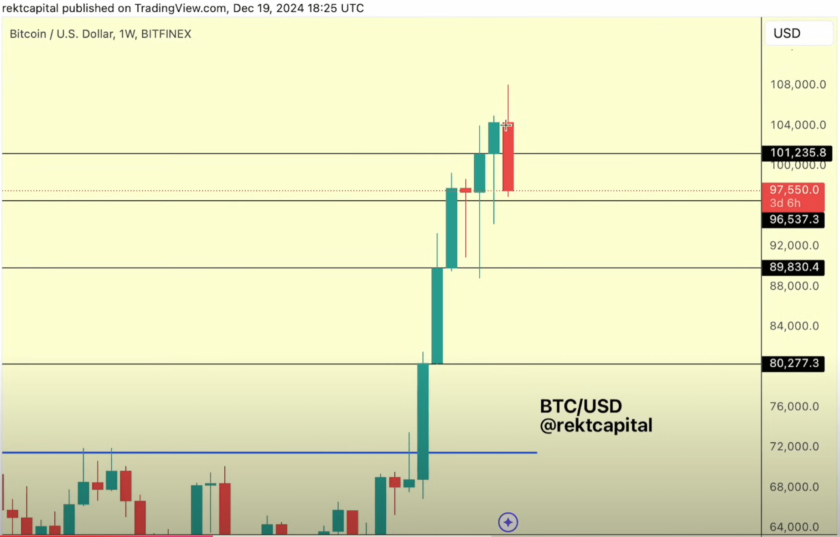The price of bitcoin closed effectively unchanged versus last week’s close – after hitting a recent high of $5,640 – as a result of the New York Attorney General Office’s claims that Bitfinex has been covering up an $850 million loss using funds from its sister company Tether.
The Big Stories
New York Attorney General Letitia James announced on April 25 that her office obtained a court order against iFinex, the parent company of Bitfinex and Tether, to investigate potential fraud involving the mishandling of funds. She alleges that the company has been covering a shortfall of $850 million using borrowed funds from Tether without disclosing this to its investors or users.
Not only has this news rocked the price of bitcoin, but it has also caused the price of Tether (USDT), which is supposed to be $1.00 at all times, dropped to as low as $0.979 in the fallout of the investigation announcement as investors doubted the stability of the coin.
Interestingly, as ShapeShift CEO Erik Vorhees pointed out on Twitter, should the NYAG be correct with her claims, then the US dollars that Tether claims to back its stablecoin have actually always existed.
On a positive note, Samsung seems to be jumping head first into crypto. The South Korean technology giant is reportedly developing an Ethereum-based blockchain network that could result in the issuance of its own digital token. This news follows the company’s recent launch of a digital asset wallet for its new Galaxy S10 smartphone.
Unsurprisingly, the altcoin market also found itself in the red to close the week, with major currencies and tokens losing around five to ten percent of their value compared to last week’s close. Not even Binance Coin (BNB), which has been this year’s outperformer, managed to buck the trend and also ended up loses around three percent.
The week’s contributions have been provided by Aisshwarya Tiwari, Liam J Kelly, and Tokoni Uti.
NYAG Accuses Bitfinex and Tether of Mishandling Client Funds; Crypto Market Tanks
According to an exhaustive document published by NYAG-representative Letitia James, crypto exchange Bitfinex and its affiliated “king of stablecoins” Tether have been accused of mishandling clients’ funds to cover up business losses.
James announced that she had obtained a court order against iFinex Inc., the Hong Kong-based parent company of both Bitfinex and Tether to prohibit it from operating outside the boundaries of New York law and defrauding the city’s crypto investors.
Per the statement by the NYAG, Bitfinex transferred close to $850 million of client and corporate funds to its payment processor firm called Crypto Capital Corp. Of this amount, it is alleged that the exchange used some funds from Tether’s reserve to make up the shortfall. Moreover, the Attorney General also accused the exchange of not reporting the loss and the movement of Tether’s funds to customers.
To date, Bitfinex has exhausted nearly $700 million worth of Tether reserves to pay for the losses, James said.
These allegations have rekindled doubts over Tether’s claim that each of its USDT tokens is backed by $1 worth of assets. It is this promise that essentially makes USDT a stablecoin which can be used to trade an array of cryptocurrencies listed on exchanges across the world. Notably, about 80 percent of all bitcoin trading is done in USDT, per data from research site CryptoCompare.
Indian Government Mulling Blanket Ban on Cryptocurrencies
The government of India has drafted a bill to completely ban cryptocurrencies and regulate official digital currencies, reports The Economic Times, April 26, 2019. Since its inception, the growth of the Indian cryptocurrency ecosystem has been continually stalled due to government and Reserve Bank of India (RBI) diktats.
It has now been more than a year since the government banned Indian banks from dealing with crypto-based business ventures and the state of the nascent industry looks as static as ever. In fact, things have only gone downhill as a number of cryptocurrency exchanges and entities have shuttered their businesses due to the challenging regulatory environment.
Now, it seems that things might go from bad to worse for the Indian cryptospace as according to The Economic Times, the Indian government has commenced inter-ministerial consultation on a draft bill to put a blanket ban on cryptocurrencies. This means that should the proposed bill be passed in the parliament, it would make it challenging for Indians to even hold or trade cryptoassets.
Government officials told The Economic Times that the “Banning of Cryptocurrencies and Regulation of Official Digital Currencies Bill 2019″ draft has been circulated to relevant government departments for consultation before it is introduced in the Lok Sabha – the lower house of the Indian Parliament.
Nike Quietly Patents the Term “Cryptokicks”
On April 19, 2019, the United States Patent Trademark Office (USPTO) revealed that Nike had filed for a patent of the term “Cryptokicks,” a brand of cryptocurrency. The details of the patent indicate the launch of “a digital currency or digital token for use by members of an on-line community.” More importantly, the application was filed under an intent-to-use clause, meaning that the American multi-national must follow through with a product to claim the patent.
The announcement to launch a native token falls in line Nike’s push to improve it’s digital business operations.
As reported by the Portland Business Journal on April 24, 2019, the company crossed the $1 billion threshold for Q1 sales in 2019. The firm’s digital makeover comes in the form of numerous digital applications including Nike+ membership, SNKRS app, the Nike Run Club, and it’s WeChat store. Now it seems that Nike will launch a native cryptocurrency to support this mission.
Josh Gerben, a trademark attorney based in Washington, D.C., explained that “the application was filed on what’s called a 1B basis. This means the application was filed on an intent to use the trademark.” Filing under these conditions means that a firm has also signed a “bona-fide intent” to use the term Cryptokicks for a future product.
Further details of the patent offer a number of different uses that a Cryptokicks token would offer. This includes curated scavenger hunts, obstacle courses, entertainment services, online mobile gaming applications and vague provisions for “crypto-collectibles.” The filing also indicates the use of “online non-downloadable computer software for use as a cryptocurrency wallet.”
Brave Users Can Now Earn Rave Tokens (BAT) for Viewing Ads
After months in its beta stage, Brave announced on April 24, 2019, that their Brave Rewards advertising program is now launched, giving users up to 70 percent of the ad revenue when they choose to view ads.
The privacy-centric browser has become a favorite of blockchain enthusiasts and regular Internet users all over the world for going against the mold and ensuring a high level of security and privacy for their users as well as an interesting system of advertising.
Typically, Brave users can choose to opt out of advertising and enjoy the browser without needing to view ads. Should they choose to view ads, they will be able to earn up 70 percent of all the ad revenue as part of the Brave advertising rewards system, which had been teased out for several months.
The Brave advertising model puts an interesting spin on traditional advertising. Usually, Internet users are given little incentive to view ads other than the fact that they would have to pay to block internet advertising.
In the case of Brave, users can opt-in to see adverts and in return, they will receive 70 percent of the ad revenue share as a reward for their attention in the form of Basic Attention Tokens (BAT).
Coinme to Expand Bitcoin Kiosk Service to More than 2,000 Locations
U.S.-based supermarket kiosk chain Coinstar, in partnership with blockchain startup Coinme, announced on April 24, 2019, that it is expanding the footprint of its bitcoin-buying service across 19 states and 2,000 locations in the country.
Coinme, a venture-backed fintech startup that is making it easier for people to buy bitcoin declared that it is going to ramp-up its digital currency business. The blockchain firm stated that it is going to increase the number of bitcoin kiosks across the U.S.
After becoming the first licensed bitcoin kiosk company in the U.S. in 2014, it didn’t take long for Coinme to transform into the largest service provider in the world. The partnership with kiosk chain Coinstar helped Coinme to increase its machine count from the initial 70 to more than 2,100.
Neil Bergquist, CEO, and co-founder of Coinme, said:
“Our rapid growth is the result of our leadership in digital currency from the early days of the industry and our expanded ability to offer local kiosks for its purchase. Through our relentless focus on customer success and product innovation, we have become the trusted, safe and secure global standard for digital currency exchange.”
Like BTCMANAGER? Send us a tip!
Our Bitcoin Address: 3AbQrAyRsdM5NX5BQh8qWYePEpGjCYLCy4




